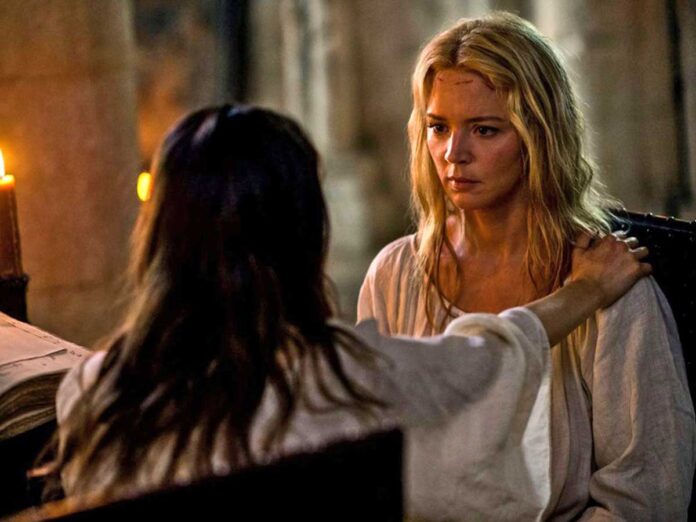The notorious filmmaker Paul Verhoeven (“Showgirls”) has never been subtle, and even fans who appreciate his penchant for outrageousness will find his nunsploitation biopic, “Benedetta,” overheated. “Inspired by real events,” this film, opening theatrically December 3 at the PFS Bourse, Neshaminy and Cherry Hill (and available on VOD December 21), recounts this life of Benedetta Carlini (Virginie Efira), who enters a convent in Italy in the 17th century.
Verhoeven, who wrote the screenplay with David Birke — they adapted Judith C. Brown’s book, “Immodest Acts: The Life of a Lesbian Nun in Renaissance Italy” — open their film with a bird shitting on the face of a man who challenges Benedetta’s ability to communicate with the Virgin Mary. In the next scene, a performer on stage is lighting his farts as Benedetta enters a convent in Pescia. When Benedetta prays to a statue one night, it falls on her, and she suckles its bare breast. It is declared a miracle that Benedetta was not crushed by the statue.
Cut to 18 years later, when Bartolomea (Daphne Patakia) enters the convent. Benedetta touches the showering novice’s breast accidentally, and it awakens something in her. She tries to punish Bartolomea, who touches her inappropriately during a religious service, “because suffering is the only way to know Christ.” Alas, Benedetta really wants to know Bartolomea, even though she tells the Abbess (Charlotte Rampling) that she has compassion, not attraction, for Bartolomea.
Verhoeven is only just getting started, and he injects the film with a number of outré fantasy scenes where Benedetta envisions Jesus (Jonathan Couzinié). One involves a number of CGI snakes swarming around her; another episode, which features copious bloodshed, has Benedetta being saved by a man she thinks is Jesus; he beheads the man about to rape her. As risible as these moments are, they are hardly the most ludicrous in “Benedetta.”
When Bartolomea volunteers to share Benedetta’s room, she also contrives a way to see Benedetta naked. Benedetta, in return, implores Bartolomea to “feel her big heart” — which seems to be code for “touch my bare breast.” There is no choice but to give into the nun’s desire.
It is another vision of Jesus, which involves Benedetta getting naked for Christ and removing his loincloth as well(!) that causes Benedetta to experience stigmata. She soon takes over as the Abbess at the convent. Moreover, her new position allows her a private room. Bartolomea takes this opportunity to introduce her lover to the carnal sins, er, pleasures, of the fleshly desire. After a vigorous sex scene, the two women become insatiable, and before long Bartolomea is carving a dildo out of a blessed virgin statue to satisfying Benedetta’s urges. Subtle, it ain’t. Erotic, it might be.
Verhoeven films the sex and full-frontal female nudity with absolute glee — damned be anyone who thinks this is blasphemous. But the things get serious when one nun, Christina (Louise Chevillotte), tells the Abbess that Benedetta is lying about her stigmata. A power struggle ensues. The second half of “Benedetta” focuses on Alfonso Giglioli (Lambert Wilson) investigating this accusation and the consequences of false witness. Much flagellation ensues, and so does betrayal.
Had Verhoeven not been so cheeky in his first half, the film’s more serious moments might have had some power. The relationship between Benedetta and Bartolomea emphasizes the eroticism rather than the emotion, and the historical significance of their lesbianism is not addressed (as it reportedly was in the book). Moreover, the actresses are not given characters to play. Their motivations seem to be: how can they get undressed? Verhoeven makes their relationship less compelling as it develops. The initial sexual tension between them is more enjoyable than the consummation and aftermath.
“Benedetta” does score points for its depiction of the hypocrisy of the church, and the way Alfonso, among others, manipulates things to avoid addressing shameful situations. One of the film’s more amusing jokes occurs after Benedetta and Bartolomea have had their first night of sexual passion. At breakfast the next morning, a priest is about to read from Leviticus. However, they are interrupted by Christina and talk of devilry and blasphemy.
Eventually, the plague becomes a concern for everyone, and there are various deaths that cast a pall on things. Verhoeven may be aiming for some semblance of historical accuracy but the film loses its way during its over-the-top climax as chaos reigns. And despite historical end titles, the filmmaker is deliberately cagey about what is real, even though he is quite explicit about what is imagined.
Nevertheless, it is hard to take “Benedetta” seriously. Virginie Efira laudably goes all in with her performance, but viewers may feel embarrassed for her, especially when Benedetta adopts a voice of God and starts telling folks that evil is coming. In support, Charlotte Rampling is entertaining as the Abbess because she plays rigid. But Daphne Patakia registers mostly as a blank. Her character should have been more passionate outside the sex and nude scenes.
Ultimately, “Benedetta” provides agony and ecstasy in equal measure.

